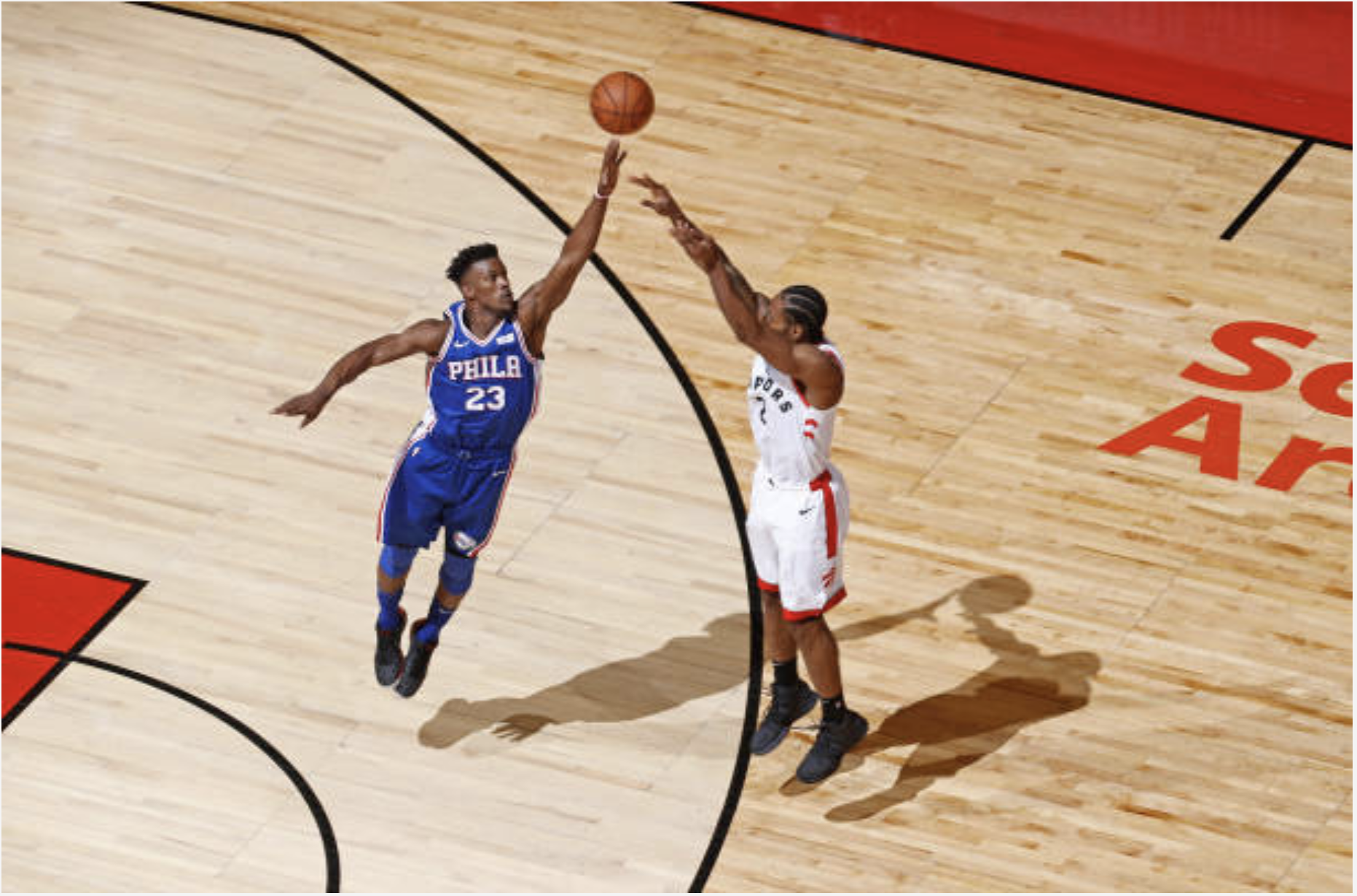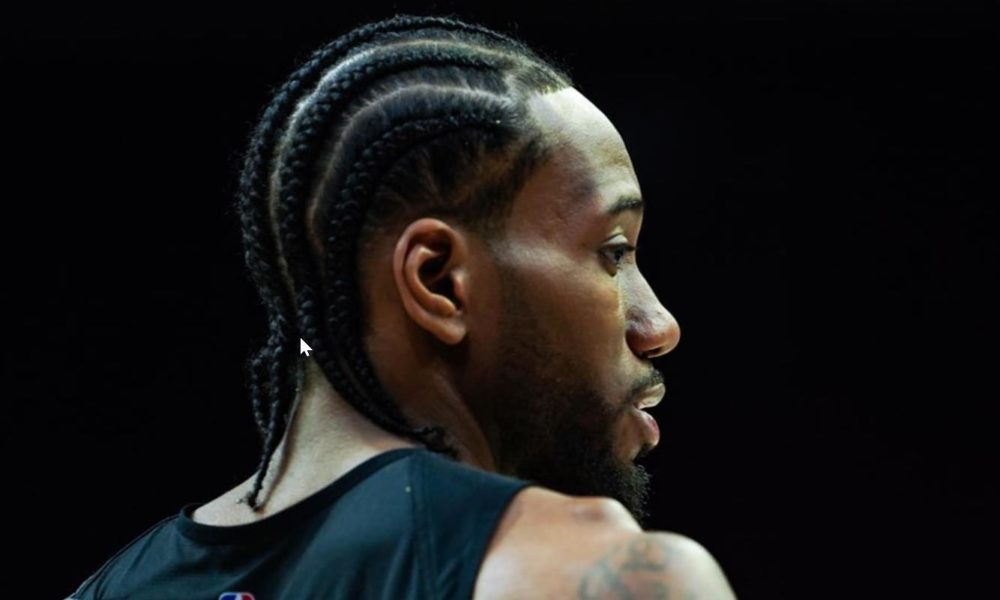After the second game between the Toronto Raptors and Philadelphia 76ers, there was a strange line of questioning involving Jimmy Butler’s first name. Brett Brown lavished praise on the wing scorer, who had just completed a 30-point, 10-rebound, 5-assist performance, calling him the “adult in the gym.” Perhaps because the name ‘James’ sounds more adult than the diminutive form, ‘Jimmy’, Brown referred to Butler as “James Butler”. Butler himself, however, wasn’t having it. When told of the conversation, he interrupted the journalist to say, “My name isn’t James. It’s literally Jimmy.”
It was odd, and everyone shared a laugh.
But Brown was right in principle, aside from mislabeling Butler’s legal moniker. Through six games between the Sixers and the Raptors, Butler has indeed been the adult of the series. He hasn’t been the series’ best player, for that distinction belongs to Toronto’s Kawhi Leonard. But adults are not necessarily the best at things. They’re the most mature, the most committed; being an adult involves accomplishing the tedium required to finish goals. Butler has done that and more, and the Raptors could learn from his performances through six games.
Butler has impacted many of the most important moments of the series, like an athletic Creed of The Office popping up with one-liners in big moments. Game six was a dominant performance from the Sixers, but the Philadelphia win wasn’t a foregone conclusion. With three minutes left in the second half, the Raptors cut the lead to eight, and Marc Gasol let fly a wide-open triple. Of course, he missed, and Butler later drove baseline to dish to Mike Scott for an easy floater. Butler missed a triple on the next possession, but followed his shot, ate the rebound with Kyle Lowry on his hip, and hit a banking jumper while drawing the foul. If that wasn’t enough, he made a layup in Pascal Siakam’s grill with seconds remaining before stealing the ball from Leonard and then laying it in again while time expired. The Sixers won the half 58-43, and game six was for all intents and purposes over. The Raptors would make other runs, but the Sixers always found counterpunches to maintain their lead.
Butler has been clutch in a way that some Raptors have not this series. Lowry was applauded for his game-sealing offensive rebound in the last 30 seconds of game three against the Orlando Magic. Where have those clutch performances been against the Sixers? While Lowry’s non-scoring performances are usually enough to lead the Raptors to victory, they’ve been short of adequate against the Sixers. More important than Lowry’s passing, charge-taking, and heady overall play has been his refusal to attempts triples despite the Sixers cheating far off of him without the ball and even ducking under picks when Lowry receives a ball screen. By and large, it’s been Butler defending Lowry, Butler limiting the heady point guard’s offensive contributions.
Lowry attempted 7.0 triples per game this year, and that was while deferring to his teammates. Against the Sixers, his attempts have slipped to 5.3 triples per game, despite Butler leaving him vast acres of space from which to launch. Gasol, too, has been haunted by his freedom to shoot. The only thing worse than missing 3s is refusing to pull the trigger on open ones. Nick Nurse has multiple times reiterated this fact to media during the series, yet his team continues to be daunted by the space that the Sixers are giving them to shoot.
Butler has not had that problem. In the regular season, he attempted only 3.0 triples per game. He’s not an elite shooter from distance. But against the Raptors, he’s shot 4.7 times per game from deep. He has decidedly not shot well, shooting below 30 percent from deep, but his refusal to hesitate – whether he misses or not – has actually been a great boon to the Sixers. Philadelphia often has trouble creating spacing on offense, so Butler has launched freely to compensate. Whether he misses or not, his constant decisiveness has created space for teammates who need it. Butler has usually missed, but Toronto has started treating him like a shooter. Contrast that with Toronto’s shooters, who are far more talented than Butler in that regard, but whom Philadelphia has begun treating like non-shooters.
There is a difference between intelligence and will. Toronto has arguably the most intelligent lineup in basketball. Lowry and Gasol are certified basketball geniuses. If they weren’t basketball players, in another life they could probably have worked for NASA. But for all their knowledge, they have not displayed wisdom. Gasol has run Joel Embiid off the arc – from where Toronto desperately wants Embiid to shoot – countless times over the series. Both Lowry and Gasol have refused to establish themselves as shooters. Sometimes the simplest play is the most intelligent play. That’s the wisdom that Butler has shown in this series. He can’t pass like Gasol or Lowry, can’t play team defense like either, can’t angle his screens like either. Instead he takes the simplest route to his destination, which often gets him there first anyway.
It’s worthwhile to compare Siakam with Butler. The arguments about which is the better player were plentiful on social media before the series. And Siakam is probably the better player. In fact, he’s probably better at virtually every basketball skill other than midrange pull-ups. He’s a better long distance shooter, a better defender, and a far better finisher. Their numbers in the series have been relatively similar, with Siakam posting per game averages of 20.8 points, 5.7 rebounds, 2.2 assists, 2.0 steals, 45.0 percent from the field, and +1 in plus-minus. Butler has countered with 23.0 points, 7.3 rebounds, 6.3 assists, 1.2 steals, 45.5 percent from the field, and +1.8 in plus-minus.
The biggest difference between the two players has been in their leadership through their play. Siakam has had a great series. He is a fantastic player, and his future is limitless. Butler has been on another plane. He has consistently beaten the Raptors back whenever the Sixers have required it. His ability to shapeshift his game, from shooter, to point guard, to scorer, into whatever form the Sixers require has been breathtaking. Siakam has been unable to mimic Butler’s ability to rise to the occasion. Of course, Siakam is 25 and Butler 29; Butler should display more poise under pressure, for he’s done it for far longer. Siakam is injured to boot, and he’s spent more time with a defensive player of the year candidate defending him. The purpose here is not to criticize a star blossoming before our eyes, but instead to show one of the few soft skills that Siakam will need to develop, whether the Raptors win or lose game seven.
The Raptors will probably close out the Sixers tomorrow in game seven. They are at home, and they have Kawhi Leonard. That alone should be enough. But for a handful of the six games already played in the series, the Leonard-based recipe has not been enough for Toronto. One major reason why has been the immature play of some of its most mature veterans.
Being an adult means not undermining your own interests. Toronto has done that at every turn. This series should not have gone seven games in the first place, and the Raptors have been their own worst enemy on several occasions. The Raptors roster the best player in the series, are the deeper team, and have a gameplan proven to work. Yet they turned away from all that in their horrible showing in game six. They need to learn to stay out of their own way, to let the simple things come simply. And on that account, there’s no better teacher than James, née Jimmy, Butler.




